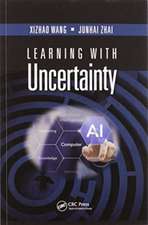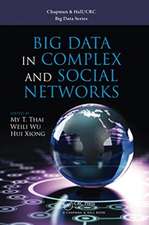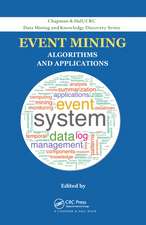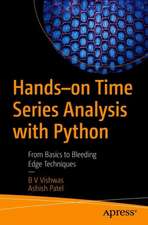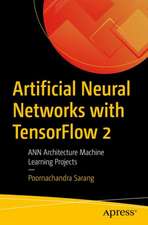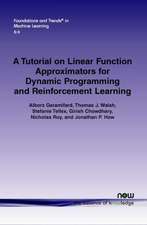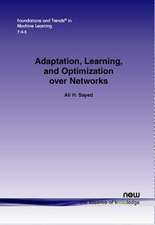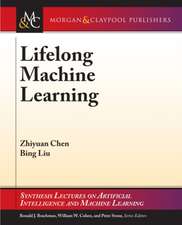Machine Learning: The Basics: Machine Learning: Foundations, Methodologies, and Applications
Autor Alexander Jungen Limba Engleză Hardback – 22 ian 2022
Machine learning (ML) has become a commonplace element in our everyday lives and a standard tool for many fields of science and engineering. To make optimal use of ML, it is essential to understand its underlying principles.
This book approaches ML as the computational implementation of the scientific principle. This principle consists of continuously adapting a model of a given data-generating phenomenon by minimizing some form of loss incurred by its predictions.
The book trains readers to break down various ML applications and methods in terms of data, model, and loss, thus helping them to choose from the vast range of ready-made ML methods.
The book’s three-component approach to ML provides uniform coverage of a wide range of concepts and techniques. As a case in point, techniques for regularization, privacy-preservation as well as explainability amount tospecific design choices for the model, data, and loss of a ML method.
| Toate formatele și edițiile | Preț | Express |
|---|---|---|
| Paperback (1) | 386.17 lei 6-8 săpt. | |
| Springer Nature Singapore – 23 ian 2023 | 386.17 lei 6-8 săpt. | |
| Hardback (1) | 367.72 lei 17-24 zile | +27.66 lei 6-12 zile |
| Springer Nature Singapore – 22 ian 2022 | 367.72 lei 17-24 zile | +27.66 lei 6-12 zile |
Preț: 367.72 lei
Preț vechi: 459.65 lei
-20% Nou
Puncte Express: 552
Preț estimativ în valută:
70.37€ • 75.24$ • 58.67£
70.37€ • 75.24$ • 58.67£
Carte disponibilă
Livrare economică 24-31 martie
Livrare express 13-19 martie pentru 37.65 lei
Preluare comenzi: 021 569.72.76
Specificații
ISBN-13: 9789811681929
ISBN-10: 9811681929
Pagini: 262
Ilustrații: XVII, 212 p. 77 illus., 42 illus. in color.
Dimensiuni: 155 x 235 x 27 mm
Greutate: 0.52 kg
Ediția:1st ed. 2022
Editura: Springer Nature Singapore
Colecția Springer
Seria Machine Learning: Foundations, Methodologies, and Applications
Locul publicării:Singapore, Singapore
ISBN-10: 9811681929
Pagini: 262
Ilustrații: XVII, 212 p. 77 illus., 42 illus. in color.
Dimensiuni: 155 x 235 x 27 mm
Greutate: 0.52 kg
Ediția:1st ed. 2022
Editura: Springer Nature Singapore
Colecția Springer
Seria Machine Learning: Foundations, Methodologies, and Applications
Locul publicării:Singapore, Singapore
Cuprins
Introduction.- Components of ML.- The Landscape of ML.- Empirical Risk Minimization.- Gradient-Based Learning.- Model Validation and Selection.- Regularization.- Clustering.- Feature Learning.- Transparant and Explainable ML.
Recenzii
“The book under review matured from lecture notes … . The structure and style strongly recommend the book as a thorough entry point for studying ML; the exercises and the references concluding each chapter reinforce concepts and also provide a curated guidance for further steps. … The (text)book reaches a balance between mathematical details, overview of algorithms and examples, making it suitable for a wide range of readers, and further underlining the interdisciplinary character of machine learning.” (Irina Ioana Mohorianu, zbMATH 1530.68002, 2024)
Notă biografică
Alexander Jung is Assistant Professor of Machine Learning at the Department of Computer Science, Aalto University where he leads the research group "Machine Learning for Big Data". His courses on machine learning, artificial intelligence, and convex optimization are among the most popular courses offered at Aalto University. He received a Best Student Paper Award at the premium signal processing conference IEEE ICASSP in 2011, an Amazon Web Services Machine Learning Award in 2018, and was elected as Teacher of the Year by the Department of Computer Science in 2018. He serves as an Associate Editor for the IEEE Signal Processing Letters.
Textul de pe ultima copertă
Machine learning (ML) has become a commonplace element in our everyday lives and a standard tool for many fields of science and engineering. To make optimal use of ML, it is essential to understand its underlying principles.
This book approaches ML as the computational implementation of the scientific principle. This principle consists of continuously adapting a model of a given data-generating phenomenon by minimizing some form of loss incurred by its predictions.
The book trains readers to break down various ML applications and methods in terms of data, model, and loss, thus helping them to choose from the vast range of ready-made ML methods.
The book’s three-component approach to ML provides uniform coverage of a wide range of concepts and techniques. As a case in point, techniques for regularization, privacy-preservation as well as explainability amount tospecific design choices for the model, data, and loss of a ML method.
Caracteristici
Proposes a simple three-component approach to formalizing machine learning problems and methods Interprets typical machine learning methods using the unified scientific cycle model: forming hypothesis Covers hot topics such as explainable and privacy-preserving machine learning

















